新版新目标英语八年级上册unit7知识点总结
- 格式:pdf
- 大小:18.74 KB
- 文档页数:3
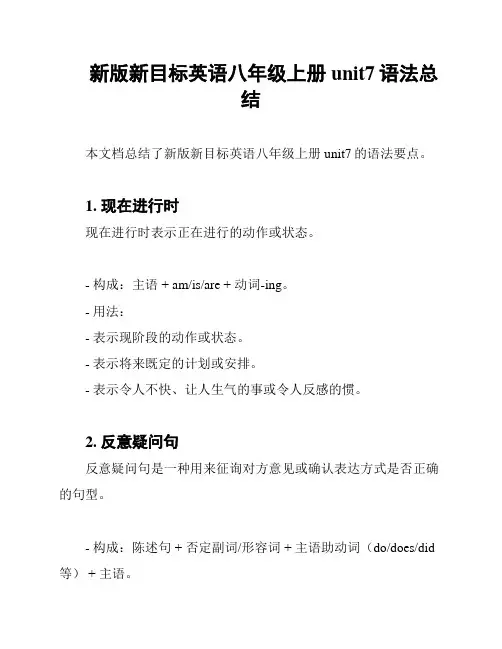
新版新目标英语八年级上册unit7语法总
结
本文档总结了新版新目标英语八年级上册unit7的语法要点。
1. 现在进行时
现在进行时表示正在进行的动作或状态。
- 构成:主语 + am/is/are + 动词-ing。
- 用法:
- 表示现阶段的动作或状态。
- 表示将来既定的计划或安排。
- 表示令人不快、让人生气的事或令人反感的惯。
2. 反意疑问句
反意疑问句是一种用来征询对方意见或确认表达方式是否正确的句型。
- 构成:陈述句 + 否定副词/形容词 + 主语助动词(do/does/did 等) + 主语。
- 用法:用于征询对方意见或确认句子的真实性。
3. with引导短语
with引导的短语可以修饰名词或句子。
- 修饰名词:
- 表示状态或特征。
- 表示方式、工具或手段。
- 修饰句子:
- 表示伴随或条件。
4. 省略to的不定式
在某些情况下,可以省略to的不定式前的to。
- 具体情况:
- 动词make、let、help、have。
- 表示让步的as if、as though、if only。
- 作宾语的动词感官动词如see、hear、feel。
以上是新版新目标英语八年级上册unit7的语法总结。
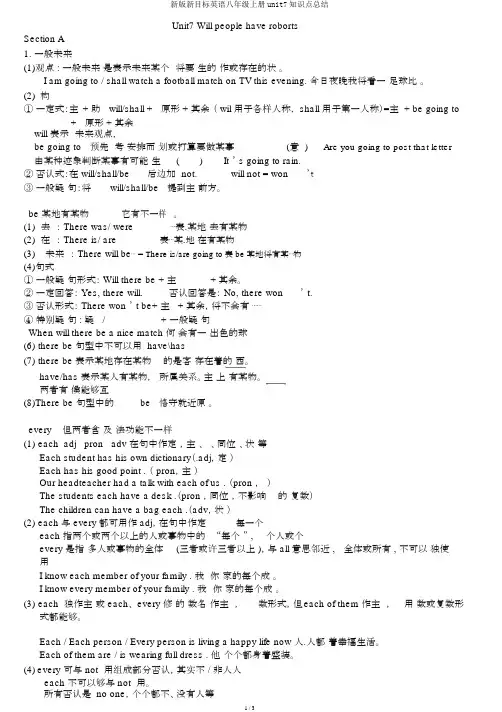
Unit7 Will people have robortsSection A1.一般未来(1)观点 : 一般未来是表示未来某个将要生的作或存在的状。
I am going to / shall watch a football match on TV this evening. 今日夜晚我将看一足球比。
(2)构①一定式:主+ 助 will/shall + 原形 + 其余( wil 用于各样人称, shall 用于第一人称)=主 + be going to+ 原形 + 其余will 表示未来观点,be going to 预先考安排而划或打算要做某事(意 )Are you going to post that letter 由某种迹象判断某事有可能生()It ’ s going to rain.②否认式:在 will/shall/be后边加not.will not = won’t③一般疑句:将will/shall/be提到主前方。
be 某地有某物它有不一样。
(1) 去: There was/ were⋯表.某地去有某物(2) 在: There is/ are表⋯某.地在有某物(3)未来: There will be⋯= There is/are going to表be某地将有某⋯物(4)句式①一般疑句形式: Will there be + 主+ 其余。
②一定回答: Yes, there will.否认回答是:No, there won’ t.③否认形式: There won ’ t be+ 主 + 其余,将不会有⋯⋯④特别疑句 : 疑 /+ 一般疑句When will there be a nice match 何会有一出色的球(6)there be 句型中不可以用 have\has(7)there be 表示某地存在某物的是客存在着的西。
have/has 表示某人有某物,所属关系。
主上有某物。
两者有候能够互(8)There be 句型中的be 恪守就近原。
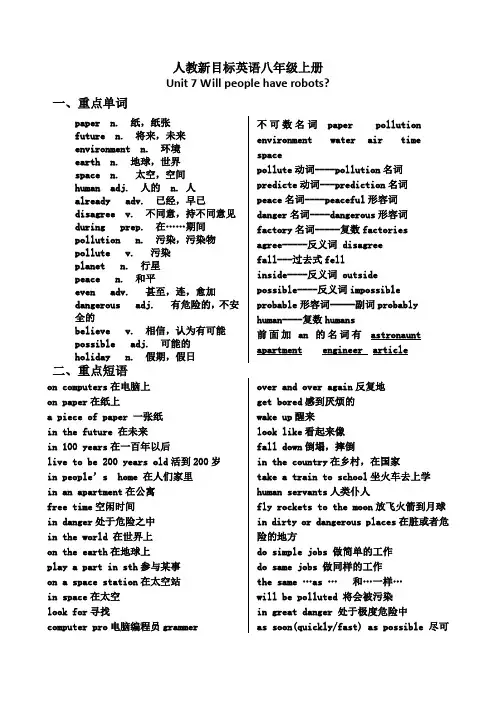
人教新目标英语八年级上册Unit 7 Will people have robots?一、重点单词paper n. 纸,纸张future n. 将来,未来environment n. 环境earth n. 地球,世界space n. 太空,空间human adj. 人的 n. 人already adv. 已经,早已disagree v. 不同意,持不同意见during prep. 在……期间pollution n. 污染,污染物pollute v. 污染planet n. 行星peace n. 和平even adv. 甚至,连,愈加dangerous adj. 有危险的,不安全的believe v. 相信,认为有可能possible adj. 可能的holiday n. 假期,假日不可数名词paper pollution environment water air time spacepollute动词----pollution名词predicte动词---prediction名词peace名词----peaceful形容词danger名词----dangerous形容词factory名词-----复数factories agree-----反义词 disagreefall---过去式fellinside----反义词 outsidepossible----反义词impossible probable形容词-----副词probably human----复数humans前面加an 的名词有astronaunt apartment engineer article二、重点短语on computers在电脑上on paper在纸上a piece of paper 一张纸in the future 在未来in 100 years在一百年以后live to be 200 years old活到200岁in people’s home 在人们家里in an apartment在公寓free time空闲时间in danger处于危险之中in the world 在世界上on the earth在地球上play a part in sth参与某事on a space station在太空站in space在太空look for寻找computer pro电脑编程员grammer over and over again反复地get bored感到厌烦的wake up醒来look like看起来像fall down倒塌,摔倒in the country在乡村,在国家take a train to school坐火车去上学human servants人类仆人fly rockets to the moon放飞火箭到月球in dirty or dangerous places在脏或者危险的地方do simple jobs 做简单的工作do same jobs 做同样的工作the same …as …和…一样…will be polluted 将会被污染in great danger 处于极度危险中as soon(quickly/fast) as possible 尽可能快的 if possible 如果可能what will happen 什么将会发生fly to +地点==go to +地点 by plane/airwill+动词原形将要做 fewer/more +可数名词复数更少/更多……less/more+不可数名词更少/更多……try to do sth尽力做某事have to do sth不得不做某事agree with sb同意某人的意见such+名词如此……play a part in doing sth参与做某事make sb do sth让某人做某事help sb with sth帮助某人某事There will be +主语+其他将会有……There is/are+sb./sth.+doing sth 有……正在做某事It is +形容词+for sb +to do sth 做某事对某人来说是怎样的三、重点句子:1. -----What will the future be like ?将来会是什么样子的?----- Cities will be more pollution.And there will be fewer trees. 将来城市会污染得更严重,树木将会少得多。
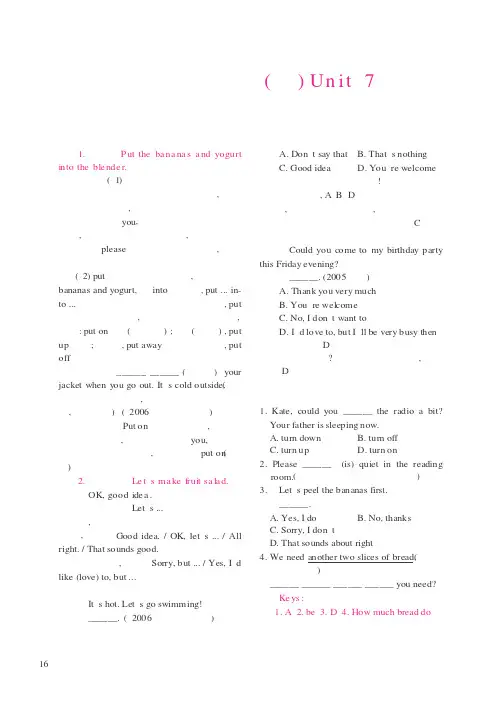
1.【原句】Put the ba na na s a nd yogurt into the ble nde r.【讲解】(1)本句是祈使句。
祈使句是用来表示劝告、请求、命令、嘱咐的句式,其主语常为第二人称,所以这类句型在形式上一般不出现主语you,而是以动词原形开头。
有时,为了使语气更客气一些,会在句首或句尾加上please。
祈使句句末用句号,有时也用感叹号。
(2)put在这里是及物动词,后跟宾语bananas and yogurt,而into是介词,put...in-to...意为“把……放在……里面”。
另外,put 常用作不及物动词,与副词组成固定词组,例如:put on穿上(衣服等);上演(戏剧),put up举起;张贴,put away把……收起来,put off推迟。
【真题】____________(穿上)your jacket when y ou go out.It’s cold outside.(根据句意和汉语提示,用词组的正确形式填空,每空一词)(2006福建省龙岩市)【点拨】填Put on。
从句意上看,本句属于嘱咐的话语,且省略了主语you,由此可断定本句应是祈使句,所以词组“put on(穿上)”中的动词要用原形。
2.【原句】—Le t’s ma ke f ruit sa la d.—OK,good ide a.【讲解】句型Let’s...是提建议的一种交际用语,意为“我们……吧”。
若对方同意该建议,可用Good idea./OK,let’s.../All right./That sounds good.等来作答。
若对方不同意该建议,可用Sorry,but.../Yes,I’d like(love)to,but...等来作答。
【真题】—It’s hot.Let’s go swimming!—______.(2006广西省南宁市)A.Don’t say thatB.That’s nothingC.Good ideaD.You’re welcome【点拨】“我们去游泳吧!”是向对方提出的一种建议,A、B、D项分别意为“不要这么说”,“没什么”、“不用谢”,故只有“这是个好主意”最符合语境及语意。
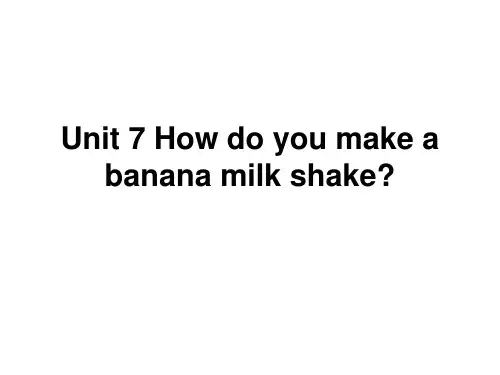
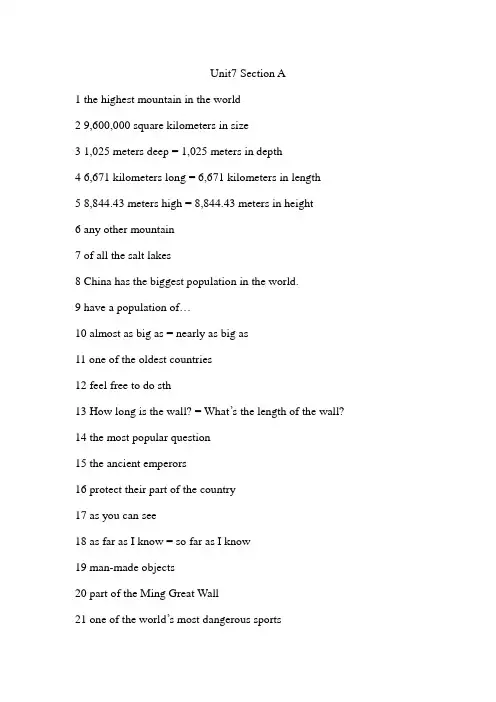
Unit7 Section A1 the highest mountain in the world2 9,600,000 square kilometers in size3 1,025 meters deep = 1,025 meters in depth4 6,671 kilometers long = 6,671 kilometers in length5 8,844.43 meters high = 8,844.43 meters in height6 any other mountain7 of all the salt lakes8 China has the biggest population in the world.9 have a population of…10 almost as big as = nearly as big as11 one of the oldest countries12 feel free to do sth13 How long is the wall? = What’s the length of the wall?14 the most popular question15 the ancient emperors16 protect their part of the country17 as you can see18 as far as I know = so far as I know19 man-made objects20 part of the Ming Great Wall21 one of the world’s most dangerous sports22 run along the southwestern part of China23 Thick clouds cover the top and snow can fall very hard.24 freezing weather conditions and heavy storms25 take in air26 the first people to reach the top27 succeed in doing sth28 risk one’s life29 challenge oneself in the face of difficulties30 achieve one’s dream31 the forces of natureSection B1 That panda weighs 100 kilos = The weight of that panda is 100 kilos.= That panda is 100 kilos heavy.2 That panda eats 10 kilos of food a day. / a kilo of…3 eat much more / eat much less / eat many times more4 at birth / be born / give birth to = have5 live up to 20 to 30 years / live to be… years old6 prepare milk for the baby pandas’ breakfast7 be awake / be asleep8 run over to them with excitement9 walk into sb10 fall over11 be so cute and lovely12 be special to sb13 There are now fewer than 2,000 pandas living in the forests.14 live in research centers in China15 every two years16 die from illnesses = die of illnesses17 eat about 10 kilos of bamboo18 cut down the forests19 endangered wild animals20 tell children about the importance of saving these animals21 a symbol of China22 try hard to help save the pandas23 better understand the habits of pandas24 jump high out of the water25 rules on whale protection26 stop putting rubbish into the sea27 protect whales from water pollution / protect…from/ against…28 even though = even if一1 Tom is taller than __ student in his class.A anyB the otherC any otherD other any2 Could you speak in a __ voice? We can hardly hear you.A friendlierB louderC softerD lovelier3--- Which one do you like __? --- Neither, thanks.A betterB the betterC bestD the best4 The store has __ the prices. The things there are cheaper than before.A keptB putC improvedD cut5 You are __ now, Victor. So you should wash your clothes by yourself.A enough youngB young enoughC enough oldD old enough6 How far is it from school? About __A 5 minutes on feetB 5 minutes walkC 5 minutes’ walkD 5 minutes-walk7 Shanghai is __ the east of China and Japan is __ the east of China.A in, inB to, toC to, inD in, to8 --- do you think is the best performer? --- Mary, of course.A WhoB WhenC WhatD Why9 There isn’t an airport near here. The __ one is about 90 miles away.A busiestB farthestC nearestD newest10 No ocean in the world is __ the Pacific Ocean.A big thanB biggest thanC as big asD as bigger as11 The clothes in this shop are cheaper than __ in that one.A thisB theseC thatD those12 Shanghai is bigger than __ in Japan.A any cityB any other cityC the other cityD the city13 There are much __ people in China than in American.A biggerB biggestC moreD most14 The population of China is much __ than that of American.A biggerB biggestC moreD most二1 Thursday is the __ (five) day of a week.2 The Himalayas run along the __ (southwest) part of China.3 When the baby pandas see the keepers, they run over to them with __ (excite).4 The main reason to build the Great Wall was to __ (保护) China.5 The Caspian Sea is the __ (deep) of all the salt lakes.6 Even more serious difficulties __ (包括) freezing weather __ (condition) and heavy storms.7 I like Chinese food better than __ (Japan) food.8 The baby pandas often die from __ (ill) and do not live very long.9 Scientists say there are now __ (few) than 2,000 pandas __ (live) in the forest.10 People want to challenge themselves in the face of __ (difficult).11 The world’s population __ (be) increasing faster and faster.12 About seventy percent of the population __ (be) farmers.13 The Yellow River is the second __ (long) in China.14 What’s the __ (weigh) of the elephant?15 This river is 20 meters in __ (deep).16 He is __ (good) of the two boys.17 This is one of __ (beauty) places.三1 What’s the population of China?__ __ __ are there in China?2 What’s the weight of the panda?__ __ __ the panda __ ?__ __ __ the panda?3 He is 1.62 meters tall.He is 1.62 meters __ __.4 This book is not as interesting as that one. This book is ___ ___ ___ that one.5 He is the oldest student in his class.He is __ than __ __ students in his class.__ __ is older than he in his class.6 I like books full of challenges and risks.I like books __ __ challenges and risks.7 Guangzhou is the south of China. Guangzhou is the __ __ of China.8 The music made her think about her family.The music __ her __ her family.9 He does his homework more carefully than his sister. His sister __ __ her homework __ __ __ he.。

Unit7 Will people have robortsSection A1. 一般将来(1) 概念 : 一般将来 是表示将来某个 将要 生的 作或存在的状 。
I am going to / shall watch a football match on TV this evening.今天晚上我将看一 足球比 。
(2) 构①肯定式:主 =主+ 助 will/shall + be going to + + 原形 +原形 + 其他其他 (wil用于各种人称, shall用于第一人称)will表示 将来概念,be going to事先 考 安排而 划或打算要做某事( 意 ) Are you going to post thatletter由某种迹象判断某事有可能 生 ( ) It ’s going to rain.②否定式:在 will/shall/be后面加 not.will not = won③一般疑 句:将will/shall/be提到主 前面。
’tbe 某地有某物它有不同 。
(1) 去 : There was/ were ⋯. 表某地 去有某物(2) 在 : There is/ are ⋯. 表某地 在有某物(3)将来 : There will be⋯= There is/are going to be ⋯表某地将有某物(4) 句式①一般疑 句形式: Will there be + 主 + 其他。
②肯定回答: Yes, there will.否定回答是: No, there won③否定形式: There won ’t be+ 主 + 其他,将不会有⋯⋯④特殊疑 句 :疑 / + 一般疑 句When will there be a nice match何 会有一 精彩的球’t.(6) there be 句型中不能用 have\has(7) there be 表示某地存在某物 的是客 存在着的 西。
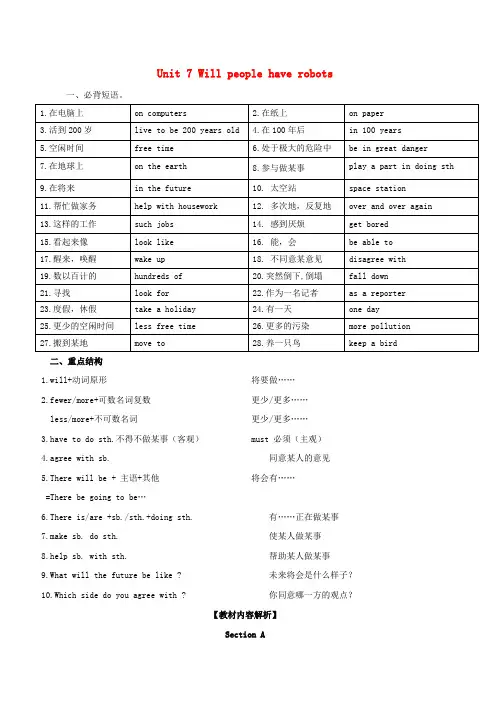
Unit 7 Will people have robots一、必背短语。
二、重点结构1.will+动词原形将要做……2.fewer/more+可数名词复数更少/更多……less/more+不可数名词更少/更多……3.have to do sth.不得不做某事(客观)must 必须(主观)4.agree with sb. 同意某人的意见5.There will be + 主语+其他将会有……=There be going to be…6.There is/are +sb./sth.+doing sth. 有……正在做某事7.make sb. do sth. 使某人做某事8.help sb. with sth. 帮助某人做某事9.What will the future be like ? 未来将会是什么样子?10.Which side do you agree with ? 你同意哪一方的观点?【教材内容解析】Section A1.Do you think there will be robots in people’s homes? (P. 49)本句是主从复合句,从句为宾语从句,如果do you think放在句中,则为插入语,放在特殊疑问词后面,结构为:疑问词+do you think+主语+谓语+其它。
例句:Which do you think is the best movie theatre?2.People will l ive to be 200 years old. (P. 49)live to be+基数词+years old意为“活到……岁”。
例句:In the story, people will live to be 500 years old.3.Will people use money in 100 years? (P. 49)“in+一段时间”表示“在……之后”或“在……之内”,通常用于一般将来时,常用来回答how soon的提问;“for+一段时间”则表示持续多长时间,用来回答how long的提问。
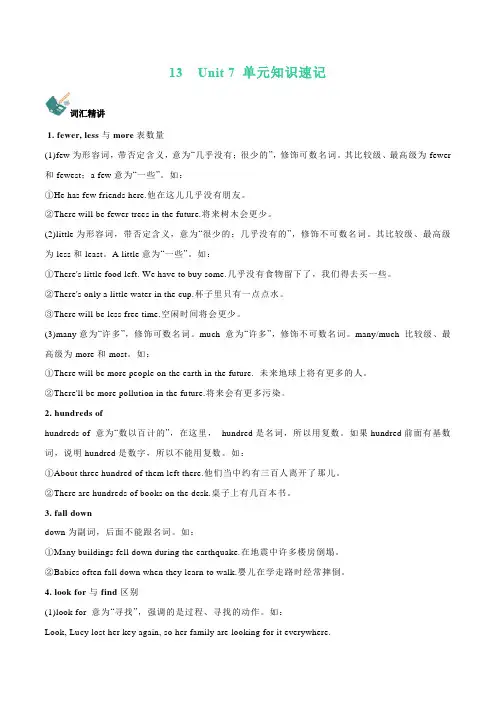
13 Unit 7 单元知识速记词汇精讲1. fewer, less与more表数量(1)few为形容词,带否定含义,意为“几乎没有;很少的”,修饰可数名词。
其比较级、最高级为fewer 和fewest;a few意为“一些”。
如:①He has few friends here.他在这儿几乎没有朋友。
②There will be fewer trees in the future.将来树木会更少。
(2)little为形容词,带否定含义,意为“很少的;几乎没有的”,修饰不可数名词。
其比较级、最高级为less和least。
A little意为“一些”。
如:①There's little food left. We have to buy some.几乎没有食物留下了,我们得去买一些。
②There's only a little water in the cup.杯子里只有一点点水。
③There will be less free time.空闲时间将会更少。
(3)many意为“许多”,修饰可数名词。
much 意为“许多”,修饰不可数名词。
many/much 比较级、最高级为more和most。
如:①There will be more people on the earth in the future. 未来地球上将有更多的人。
②There'll be more pollution in the future.将来会有更多污染。
2. hundreds ofhundreds of 意为“数以百计的”,在这里,hundred是名词,所以用复数。
如果hundred前面有基数词,说明hundred是数字,所以不能用复数。
如:①About three hundred of them left there.他们当中约有三百人离开了那儿。
②There are hundreds of books on the desk.桌子上有几百本书。
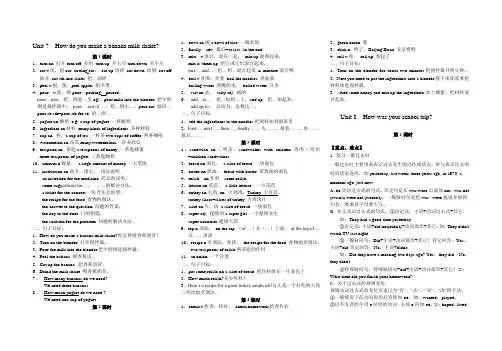
Unit 7 How do you make a banana milk shake?第1课时1、turn on 打开turn off 关闭turn up 开大点turn down 关小点2、cut v.切,割cut- cutting cut,cut up切碎cut down 砍倒cut off砍开cut sth into slices 把…剁碎3、peel v.刨,削,peel apples 削苹果4、pour v.泼,倒pour—pouring poured,pour…into…把…倒进…里eg: pour milk into the blender 把牛奶倒进搅拌器中。
pour …out of …,把…倒出…,pour out 倾诉,pour sb sth=pour sth for sb 给…倒…5、yogurt un.酸奶e g: a cup of yogurt 一杯酸奶6、ingredient cn.材料many kinds of ingredients 各种材料7、cup cn. 杯,a cup of tea ,一杯茶two cups of coffee 两杯咖啡8、watermelon cn.西瓜,many watermelons 许多西瓜9、teaspoon cn. 茶匙a teaspoons of honey 一茶匙蜂蜜three teaspoons of yogurt 三茶匙酸奶10、amount n.数量,a large amount of money一大笔钱11、instruction cn.命令,指示,用法说明,an instrction for the medicine ,药品的说明,some sug gestions for …,……的解决办法,a ticket for the concert,一张音乐会的票,the recipe for the food ,食物的做法,the answer to the question 问题的答案,the key to the door 门的钥匙,the solution for the problem 问题的解决办法。
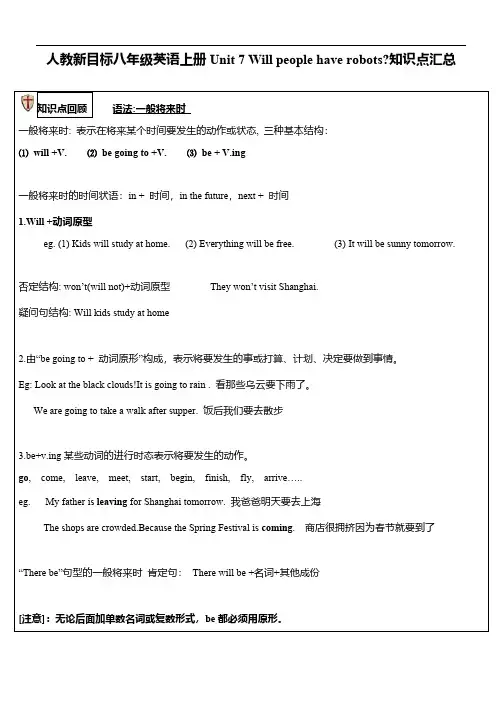
知识点回顾语法:一般将来时一般将来时: 表示在将来某个时间要发生的动作或状态, 三种基本结构:⑴will +V. ⑵be going to +V. ⑶be + V.ing一般将来时的时间状语:in + 时间,in the future,next + 时间1.Will +动词原型eg. (1) Kids will study at home. (2) Everything will be free. (3) It will be sunny tomorrow.否定结构: won’t(will not)+动词原型They won’t visit Shanghai.疑问句结构: Will kids study at home2.由“be going to + 动词原形”构成,表示将要发生的事或打算、计划、决定要做到事情。
Eg: Look at the black clouds!It is going to rain . 看那些乌云要下雨了。
We are going to take a walk after supper. 饭后我们要去散步3.be+v.ing某些动词的进行时态表示将要发生的动作。
go, come, leave, meet, start, begin, finish, fly, arrive…..eg. My father is leaving for Shanghai tomorrow. 我爸爸明天要去上海The shops are crowded.Because the Spring Festival is coming. 商店很拥挤因为春节就要到了“There be”句型的一般将来时肯定句:There will be +名词+其他成份[注意]:无论后面加单数名词或复数形式,be都必须用原形。
要点讲解Will there重点短语it will be difficult to do sth.不同意某人重点搭配重点短语Section A:1.play a part in saving the earth2.in 100 years3.on computers4.live to be….years old5.less free time6.world peace7.be free8.in great danger9.in the future10.move to other planetsSection B:1.fly rockets to the moon乘火箭到月球→fly up into the sky2.on a space station3.be able to…4.look for5.look like6.take a holiday7.the meaning of…..8.wake up….9.one day10.hundreds of11.over and over again12.do the same things as humans13.fall down14.seem impossible15. as a reporter语法聚焦----Will people use money----No, they won’t. Everything will be随堂练There ______a splendid football event(.I hope we'll study ______ home ______computers in the future.in;We should play a part in ______the party.organizingWe will have ______ free time next year than this year.Michael or Tony?______ ______ be a soccer match this weekend?.我们今天下午要为英语考试作准备。
新目标八年级英语上册Unit 7 How do you make a banana milk shake?讲解与练习讲解【重点短语】1.cut up 切碎2.turn on 打开3.turn off 关掉4.mix up混合在一起5.Let me think让我想想6.a slice of bread 一片面包7.two teaspoons of honey 两汤匙蜂蜜8.two cups of yogurt 两杯酸奶9.a kilo of tomatoes 一公斤西红柿10.two bowls of water两碗水11.two baskets of apples两篮苹果12.a bag of tea一袋茶叶13.add…to…把…加到…上14.pour…into… 倒…到…里15.put…in(into)…放…在(到)…里16.on the top 在顶部17.first 首先18.next 接着19.then 然后205.finally=at last 最后20.in the bowl 在碗里21. Let’s do sth. 让我们做…重要句型1.how many与how much(1).how many表示“多少”,对数量提问,后面接可数名词的复数形式。
如:---How many people are in your family?你家里有几个人?---There are four people in my family.---How many classes do you have every day?你们每天上几节课?---We have seven classes every day.(2).how much也是表示“多少”,但它对不可数名词进行提问。
如:---How much milk is there in the bottle?瓶子里有多少牛奶?---There is some milk in the bottle.(3).how much还可以对价格提问,表示“多少钱”的意思。
Unit 7 Will people have robots一、必背短语。
二、重点结构1.will+动词原形将要做……2.fewer/more+可数名词复数更少/更多……less/more+不可数名词更少/更多……3.have to do sth.不得不做某事(客观)must 必须(主观)4.agree with sb. 同意某人的意见5.There will be + 主语+其他将会有……=There be going to be…6.There is/are +sb./sth.+doing sth. 有……正在做某事7.make sb. do sth. 使某人做某事8.help sb. with sth. 帮助某人做某事9.What will the future be like ? 未来将会是什么样子?10.Which side do you agree with ? 你同意哪一方的观点?【教材内容解析】Section A1.Do you think there will be robots in people’s homes? (P. 49)本句是主从复合句,从句为宾语从句,如果do you think放在句中,则为插入语,放在特殊疑问词后面,结构为:疑问词+do you think+主语+谓语+其它。
例句:Which do you think is the best movie theatre?2.People will l ive to be 200 years old. (P. 49)live to be+基数词+years old意为“活到……岁”。
例句:In the story, people will live to be 500 years old.3.Will people use money in 100 years? (P. 49)“in+一段时间”表示“在……之后”或“在……之内”,通常用于一般将来时,常用来回答how soon的提问;“for+一段时间”则表示持续多长时间,用来回答how long的提问。
新目标八年级上册Unit 7 Will people have robots? 讲义一、词性转换1.paper n. 纸张(不可数)2.pollution n. 污染物pollute v. 污染3.prediction n. 预言;预测predict v. 预测4.astronaut n. 宇航员5.dangerous a. 有危险的danger n. 危险6.disagree v. 不同意7.possible a. 可能的impossible a. 不可能的8.probably adv. 很可能二、短语归纳1.play a part 参加(某事)2.space station 太空站3.over and over again 多次;反复地4.hundred of 许多;大量5.fall down 突然倒下;跌倒6.look for 寻找;寻求7.in great danger 在巨大的危险中8.help with 帮助9.for example 举例10.in the future 在未来11.look like 看起来像12.wake up 醒来13.fewer people更少的人14.14. less free time更少的空闲时间15.15. in ten years 10年后(提问用How soon)16.fall in love with…爱上…17.hundreds of +名词复数数百/几百(概数,类似还有thousands of; millions of)18.the same as 和……相同19.A be different from B A与B不同20.wake up醒来21.get bored变得厌倦(get/become+形容词)22.keep a bird 养一只鸟23.lots of /a lot of许多+可数或不可数名词24.disagree with sb.不同意某人(的意见)disagree on sth. 不同意某事25.I don’t agree. = I disagree.我不同意26.on vacation度假27.help sb with sth 帮助某人做某事28.live in an apartment住在公寓里live on the earth 住在地球上29.besides与except =but(除…之外,不包括)30.be able to与can 能、会31.live on a space station 住在空间站32.over and over again 一次又一次33.10 years from now 今后10年34.be difficult to do 做……有困难35.the same …as 和……一样三、重难点深度解析1. Do you think there will be robots in people's homes? 你认为将来人们的家里会有机器人吗?Do you think...? 结构通常用来征求对方的意见或看法,后面接宾语从句,从句用陈述语序。
新版新目标英语八年级上册unit7知识点总结(word版可编辑修改) 编辑整理:尊敬的读者朋友们:这里是精品文档编辑中心,本文档内容是由我和我的同事精心编辑整理后发布的,发布之前我们对文中内容进行仔细校对,但是难免会有疏漏的地方,但是任然希望(新版新目标英语八年级上册unit7知识点总结(word版可编辑修改))的内容能够给您的工作和学习带来便利。
同时也真诚的希望收到您的建议和反馈,这将是我们进步的源泉,前进的动力。
本文可编辑可修改,如果觉得对您有帮助请收藏以便随时查阅,最后祝您生活愉快业绩进步,以下为新版新目标英语八年级上册unit7知识点总结(word版可编辑修改)的全部内容。
Unit7 Will people have roborts?Section A1.一般将来时(1)概念:一般将来时是表示将来某个时间将要发生的动作或存在的状态.I am going to / shall watch a football match on TV this evening。
今天晚上我将看一场足球比赛。
(2)结构①肯定式:主语 + 助动词will/shall + 动词原形 + 其他(wil用于各种人称,shall用于第一人称)=主语 + be going to + 动词原形 + 其他will表示单纯将来概念,be going to强调事先经过考虑安排而计划或打算要做某事(意图) Are you going to post that letter?由某种迹象判断某事有可能发生(预见)It’s going to rain。
②否定式:在will/shall/be 后面加 not。
will not = won’t③一般疑问句:将will/shall/be 提到主语前面.2.There be 某地有某物它有不同时态。
(1)过去时态:There was/ were…。
表某地过去有某物(2)现在时态:There is/ are …。
Unit7 Would you mind turning down the music?一、[重点词组](Key Phrases)1.right away ==at once ==in a minute 马上立刻;3.do the dishes ==wash the dishes(饭后)洗餐具4.get up 起床5.put on穿上\take off 脱下6.at a meeting 在开会7.(that’s )no problem 没问题8.hair stylist 发型师9.be annoyed 烦恼的10.make some posters 做一些招贴11.wait in line排队等候12.cut in line插队13.all the time始终14.try not to do sth.试图不做某事Try to do sth. 尽力干某事Try one’s best to do sth.尽全力去干某事15.get angry生气16.pay a big fine付一大笔罚金17.in other parts of Asia在亚洲的其他部分18.throw away扔掉19.argue about议论某事20.so much trouble这么多麻烦21.fly kites放风筝22.three and a half years三年半23.allow to do sth.允许做某事Be allowed to do 被允许做某事24.the physical and mental health身体和心理健康25、wear old jeans 穿牛仔裤26.Cook by oneself 自己做饭27. return ----to ----把某物归还给某人28. leave sth. Sp. 把某物留在某地\把某物落在某地29.make dinner 做晚饭30. complain about 抱怨31. have a long telephone conversation 长时间通电话32. follow (=go after) sb. Around 到处跟着某人33. sth. Happen to sb.某人发生了某事\某事发生在了某人身上34. be polite 有礼貌的\be impolite 无礼貌的35. spend +时间\金钱+on +某物花费时间或金钱在某物上Spend +时间+in +doing 花费时间干某事Spend +时间+with +sb.与某人共渡时光36. normal and polite social behavior 正式的礼貌的社交行为37. be useful 有用的38. be close to 靠近39. even if 即使40. keep ------+形容词使-----保持某种状态41. in public (places) 在公共场合42.take care (=be careful) 当心43. break the rules 违反规则44. put out 熄灭45. drop litter 乱扔垃圾46. have diffrent ideas (about) 对----有不同的看法\观点二.语法知识1、Would you mind + doing …?你介意……吗?请你……可以吗?例如:Would you mind moving your bike?---Not at all. 不介意I’ll do it right away.2、Would you mind not doing…?请不要……好吗?例如:(1)Would you mind not wearing the old jeans?OK, I’ll put on another pair.(2)Would you mind not playing the football here?I’m sorry.3、would作为情态动词,主要用于第二人称的疑问句中,表示询问对方的意愿或者想对方提出请求,时间指现在或者将来。
Unit7 Will people have roborts?Section A1.一般将来时(1)概念: 一般将来时是表示将来某个时间将要发生的动作或存在的状态。
I am going to / shall watch a football match on TV this evening. 今天晚上我将看一场足球比赛。
(2)结构①肯定式:主语+ 助动词will/shall + 动词原形+ 其他(wil用于各种人称,shall用于第一人称)=主语+ be going to + 动词原形+ 其他will表示单纯将来概念,be going to强调事先经过考虑安排而计划或打算要做某事(意图) Are you going to post that letter? 由某种迹象判断某事有可能发生(预见) It’s going to rain.②否定式:在will/shall/be 后面加not. will not = won’t③一般疑问句:将will/shall/be 提到主语前面。
2.There be 某地有某物它有不同时态。
表某地过去有某物(1) 过去时态:There was/ were….表某地现在有某物(2) 现在时态:There is/ are ….表某地将有某物(3) 将来时态:There will be …= There is/are going to be…(4)句式①一般疑问句形式:Will there be + 主语+ 其他。
②肯定回答:Yes, there will. 否定回答是:No, there won’t.③否定形式:There won’t be + 主语+ 其他,将不会有……④特殊疑问句: 疑问词/ 词组+ 一般疑问句?When will there be a nice match?何时会有一场精彩的球赛?(6) there be句型中不能用have\has(7) there be 表示某地存在某物强调的是客观存在着的东西。
have/has 表示某人有某物,强调所属关系。
主观上拥有某物。
二者有时候可以互换(8)There be 句型中的动词be 应该遵守就近原则。
3.each every 但二者含义及语法功能不同(1) each adj pron adv 在句中作定语,主语、宾语、同位语、状语等Each student has his own dictionary.(adj,定语)Each has his good point . (pron,主语)Our headteacher had a talk with each of us . (pron,宾语)The students each have a desk . (pron,同位语,不影响谓语动词的单复数)The children can have a bag each . (adv,状语)(2)each与every都可用作adj,在句中作定语每一个each 指两个或两个以上的人或事物中的“每个”, 强调个人或个别every是指许多人或事物的全体(三者或者三者以上),与all意思相近, 强调全体或全部, 不能单独使用I know each member of your family . 我认识你们家的每个成员。
I know every member of your family . 我认识你们家的每个成员。
(3)each 单独作主语或each、every修饰的单数名词作主语时,谓语动词为单数形式,但each of them作主语时,谓语动词用单数或复数形式都可以。
Each / Each person / Every person is living a happy life now . 人人都过着幸福生活。
Each of them are / is wearing full dress . 他们个个都身着盛装。
(4)every可与not连用构成部分否定,并不/非人人each不可以与not连用。
全部否定是no one,个个都不、没有人等并非人人都喜欢电视剧部分否定Each / Everyone / Every one of them doesn’t like the TV play .No one likes the TV play . 完全否定(5)表示每隔……、每……,要用every+基数词+复数名词。
every不能用each替代。
They’ll choose one out of every ten girls . We hand in our homework every three days .4. after与in的用法区别in +时间段与将来时连用以现在的时间为起点,多久之后in +时间短语一般用how soon提问,要过多久以后,要到什么时候after +时间段与过去时连用以过去或将来某个时间为起点,将过多久after +时间点可与将来时连用He will be back after two o'clock.He will be back in two hours. He came back after two hours.5.(1) fewer 更少的few的比较级,修饰可数名词复数(2) less 更少的little的比较级,修饰不可数名词(3) more 更多的many much的比较级,修饰复数/不可数名词6. pollution n. 污染,污染物(不可数名词)air pollution空气污染noise pollution pollute v. (使)污染pollute the seapolluted adj. 被污染的polluted water被污染的水7. What will the future be like ? 未来将会是什么样子?What’s sb… like ?某人怎么样?(询问相貌性格品质)be like 像(多方面像) ook like 看上去像(外表方面像)8. in danger 处于危险之中out of danger 脱离危险的有take.9. 主语为人的有spend和pay;主语为物的有cost;主语常为“it”(1) spend表“某人花费时间或金钱做某事/在某事上”,用于:Sb spend some money/ time (in) doing sth. 或Sb spend some money/ time on sth(2) pay常表“某人花钱买某物”。
用于:Sb. pay some money for sth.(3) cost 常表“某物花费某人某些钱”,用于:Sth. cost sb. some money.(4) take尤指“做某事花费某人某些时间”, 常用于:It takes sb some time to do sth10.on the earth在地球上地点状语句首句尾on earth 究竟,到底用于疑问代词或副词后,加强语气Section B1. human 人,人类,有别于动物,自然景物,机器等特殊群体;也可指具体的人。
He was the only human on the island. 他是岛上唯一的人类。
person 无性别之分,常用于数目不太大而且数目比较确定的场合three personspeople 泛指人们,表示复数概念。
many peopleman前不带冠词而且单独使用时,指男人, a man 可指一个人/ 一个男人,复数形式为men. Man is stronger than woman.2. help (sb) with sth. 在某方面帮助某人3. There is/ are sb. doing sth. 某地有某人/某物正在做某事There are already robots in factories. (work )有机器人正在工厂工作。
There are several factories waste water into the river. (pour)4. do simple jobs over and over again 反复地做一些简单的工作5. get bored 变厌倦(+ ed描述人;+ing描述事物)Fewer people will do such jobs in the future because they are _________, but robots will never get _________.6. do the same things as we do 跟我们做相同的事情7. be able to do sth. 能做某事经过努力而成功做成某事有人称和数的变化can 没有人称和数的变化现在式和过去式表示请求允许推测能力8. wake up 醒来wake sb. up 叫醒某人代词必须放在中间9.agree with sb. 同意某人disagree with sb. 不同意某人10.hundred 数词百hundreds of 许多大量数百的数以百计的(1)当这类数词前面有具体的数字时, 数词不能用复数形式:three hundred students 三百学生, five thousand五千, a few hundred 几百。
(2)当数词前没有具体数字时, 数词用复数形式,后面接短语, 再加可数名词的复数形式hundreds of students 数百名学生thousand, million与其用法相同11.talk 谈话,对话(1)talk to...跟……谈话(对话)(2) talk of...谈到;谈起We often talk of you. 我们常常谈到你。
(3)talk about...谈论某人或某事What are you talking about? 你们在谈论什么?(4)talk with...同……交谈He is talking with a friend. 他在和一个朋友谈话。
12. seem v 好像,似乎,看来看似, 连系动词(1) seem + to do sth似乎/看起来/好像做某事He seems to think so. 他似乎认为如此。
(2) It seems/seemed that 看来……It seems that he is lying. 看来他在撒谎。
(3) seem + n./adj 好像是,似乎是He seems an honest boy. 看上去他像是个诚实的孩子。
He seems a nice man.(4) seem like 好像,似乎It seemed like a good idea at the time.(5) seem to be + 形容词/名词= seem + 形容词/名词She seems to be happy.= She seems happy=She was very happy.13. during 介词在....期间during 某事是在某一段时间之间发生for 某事持续多久则in 某事具体发生的时间14. probably ad. maybe 相当于perhaps. 也许,大概,可能作状语.probably 句中,可能性最大He will probably come tomorrow.maybe/perhaps 句首Maybe/Perhaps you are right.。